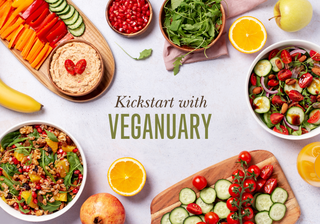Do you recommend any supplements that can help during this transition?
There are some nutrients that need particular attention in order to meet the body’s demands when following a vegan diet.
Vitamin B12 is only naturally present in animal-based foods: meat, fish, eggs and dairy. Certain plant-based foods are fortified with B12, but you may need to take a supplement to meet your individual needs.
As B12 is stored in the liver, it is unlikely you will develop a deficiency by following a vegan diet for a month. However, if your stores are already low, your levels may drop further without dietary intake. Test your B12 levels and supplement accordingly to make sure you are maintaining optimal levels if you decide to go vegan long term.
Omega 3 is available in small amounts in certain plant-based foods, but only in the alpha-linolenic acid (ALA) form that the body then needs to convert into eicosapentaenoic acid (EPA) and docosahexaenoic acid (DHA).
So while it’s worth including foods such as walnuts, hempseeds, flaxseeds and chia seeds for their omega 3 content as well as their many other benefits, if you decide to continue a fully plant-based diet, you may also want to consider an algae-oil based omega 3 supplement. Always check for contraindications with any medications you’re
taking, and look for one containing both EPA and DHA.
Iron (especially for menstruating women) is a nutrient that needs particular focus
in a vegan diet. There are a number of plant-based iron sources, so prioritise including these daily in your diet: lentils, chickpeas, beans, tofu, pumpkin seeds, spinach, chard, kale, dried apricots, dried figs and raisins. Anaemia is a common nutrient deficiency, so checking your iron, including ferritin levels, will indicate if additional supplementation is needed, whether or not you follow a vegan diet.
Calcium is often associated with dairy but there are plenty of plant-based sources. Tofu, sesame seeds, almonds, buckwheat, blackstrap molasses, dried figs, broccoli, kale, bok choy, seaweed and white beans are all calcium-rich foods to include in a vegan diet.








